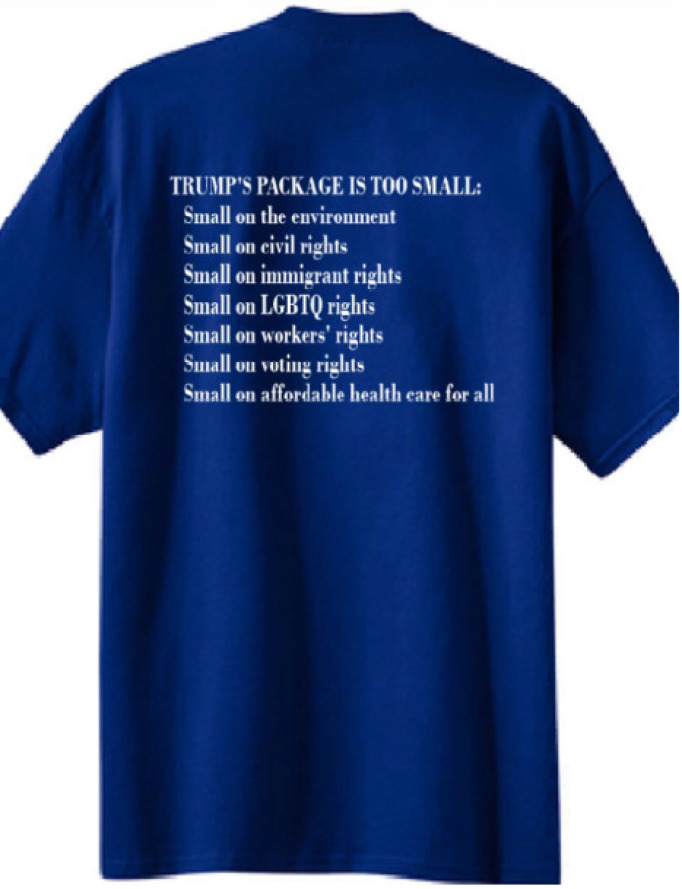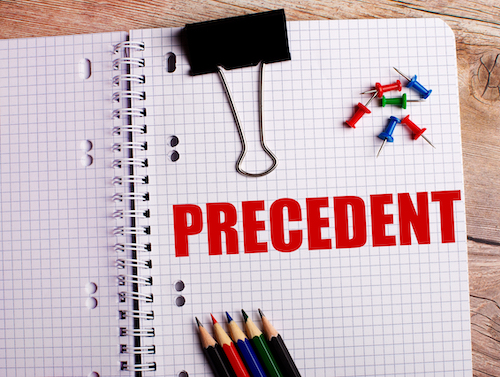High Court to Take on Vidal’s TRUMP TOO SMALL Trademark Petition
“The refusal under Section 1052(c) to register marks, like respondent’s, that criticize a government official or public figure does not ‘limit[]’ political speech….. After all, a trademark gives its owner the right to ‘prevent[] others from using the mark.’ And registration serves only to bolster those ‘rights of exclusion’.” – Vidal petition
Image submitted by Elster to USPTO
The U.S. Supreme Court today granted a petition brought by U.S. Patent and Trademark Office (USPTO) Director Katherine Vidal that asks, “whether the refusal to register a mark under Section 1052(c) violates the Free Speech Clause of the First Amendment when the mark contains criticism of a government official or public figure.”
The case was decided by the U.S. Court of Appeals for the Federal Circuit (CAFC) in February of last year, and the full court denied a request for panel rehearing or rehearing en banc in August. The February CAFC decision held the Office’s application of Section 2(c) of the Lanham Act to reject the mark TRUMP TOO SMALL was unconstitutional. Specifically, the CAFC panel held that “applying section 2(c) to bar registration of [Steve] Elster’s mark unconstitutionally restricts free speech in violation of the First Amendment.”
Elster attempted to register the trademark TRUMP TOO SMALL for use on T-shirts, but an examiner refused the application, saying that section 2(c) bars registration of a mark that “[c]onsists of or comprises a name . . . identifying a particular living individual” without the individual’s “written consent.” While Elster argued the mark was “intended as political commentary,”—particularly, to “convey[] that some features of President Trump and his policies are diminutive”—the examiner said there is no statutory or “case law carve[] out” for “political commentary.” The examiner also rejected Elster’s argument that denying the application infringed his First Amendment rights, “finding that the registration bars are not restrictions on speech, and in the alternative, that any such restriction would be permissible.”
Separately, the examiner denied registration of the mark under section 2(a)’s false association clause, which bars registration of trademarks that “falsely suggest a connection with persons, living or dead” and further rejected a First Amendment defense in that case.
On appeal, the Trademark Trial and Appeal Board (TTAB) consolidated the two cases and affirmed the examiner’s decisions on the section 2(c) grounds alone. The Board explained that Section 2(c) has been found not to be an unconstitutional restriction on free speech because it is “narrowly tailored to advance two compelling government interests: protecting the named individual’s rights of privacy and publicity and protecting consumers against source deception.”
The Federal Circuit in its analysis cited Matal v. Tam and Iancu v. Brunetti to bolster its view that “a trademark represents ‘private, not government, speech’ entitled to some form of First Amendment protection.” The court said that “[e]ven though the government in the trademark area has not imposed an absolute prohibition on speech, Brunetti further established that denying trademark registration ‘disfavors’ the speech being regulated.”
The court did express concerns about the “overbreadth” of section 2(c) under the First Amendment overbreadth doctrine, which recognizes that “a law may be overturned as impermissibly overbroad” when “a ‘substantial number’ of its applications are unconstitutional, ‘judged in relation to the statute’s plainly legitimate sweep,’” but the CAFC reserved the issue for another day.
In Vidal’s petition, filed in late January of this year, the USPTO argued that the CAFC’s holding “is incorrect, and this Court usually grants review when a court of appeals has invalidated the application of a federal statute.” Vidal pointed to Brunetti and Tam as evidence of the Court’s interest in addressing such issues, adding: “And this case presents a recurring issue under the First Amendment that this Court’s decisions in Tam and Brunetti left open: ‘whether a Lanham Act bar’ on the registration of a trademark is ‘a condition on a government benefit or a simple restriction on speech.’”
Ultimately, the petition argues that it is the registration of a mark like Elster’s that would chill speech, not the refusal of it. The petition explains:
“Section 1052(c) is not a restriction on speech; it is a viewpoint-neutral condition on a government benefit. The refusal under Section 1052(c) to register marks, like respondent’s, that criticize a government official or public figure does not ‘limit[]’ political speech….. After all, a trademark gives its owner the right to ‘prevent[] others from using the mark.’ And registration serves only to bolster those ‘rights of exclusion,’…by giving owners ‘additional protections against infringers.’” [citations omitted]
In his response brief, Elster also invoked the Brunetti and Tam cases, saying they support his argument. “In each case, this Court concluded that the restriction significantly burdened private speech and violated the First Amendment,” Elster’s brief explained. He further rejected Vidal’s contention that registering his mark would restrict others’ speech, explaining that others would still be free to use “Trump too small” in
day-to-day speech or political commentary if the mark was registered, they just wouldn’t be able to use it on competing products in the marketplace.
Quite to the contrary, Elster argued, the government’s view would chill speech. “If the government were correct, it would allow the PTO to restrict commentary on important public officials without articulating any legitimate reason for doing so,” the brief said.
One amicus brief has been filed thus far, by an individual who has filed five trademark applications involving the Trump name. Four marks comprising the slogans MAKE AMERICA GREAT AGAIN DUMP TRUMP! 2020; DUMP TRUMP AND LOCK HIM UP; and INDICT THE TRUMP ORGANIZATION were rejected and are now being appealed to the TTAB, while a fifth application for INDICT 45 is still pending. The amicus, Matthew Handal, is asking the Court to grant the petition and then to remand per curiam for affirmance of the refusal to register the trademark under Section 2(a)’s False Association Clause, rather than addressing Section 2(c). “If the constitutionality of Section 2(c) must be reached someday, it should be decided only when it is necessary to do so and on a record that properly presents the issue,” said the brief.
The full docket is available here.
Eileen McDermott
Eileen McDermott is the Editor-in-Chief of IPWatchdog.com. Eileen is a veteran IP and legal journalist, and no stranger to the intellectual property world, having held editorial and managerial positions at […see more]







